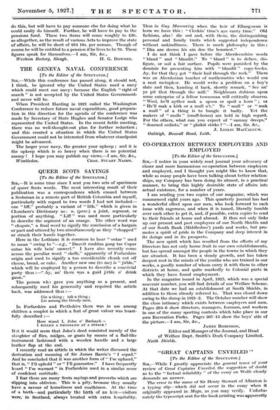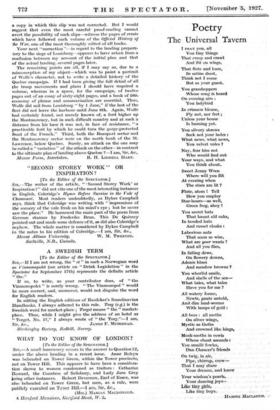"GREAT CAPTAINS UNVEILED "
[To the Editor of the SPECTATOR.]
SIR,—While I greatly appreciate the general tenor of your review of Great Captains Unveiled, the suggestion of doubt as to the " factual reliability " of the essay on Wolfe clearly
demands an answer.
The• error in the name of Sir Henry Stewart of Allanton is a typing slip—which did not occur in the essay when it originally appeared in Maga, as you may verify. Unfortu• nately the typescript sent for the book printing was apparently
a copy in which this slip was not corrected. But I would suggest that even the most careful• proof-reading cannot
avert the possibility of such slips—witness the pages of errata which have followed each volume of the Official History of the War, one of the most thoroughly edited of all books.
Your next "correction "—in regard to the landing prepara- tory to the siege of Louisburg—appears to have arisen from a confusion between my account of the initial plan and that of the actual landing, several pages later.
The remaining points are all, if I may say so, due to a miseoneeption of my object—which was to paint a portrait
of Wolfe's character, not to write a detailed history of the Quebec campaign. If I had been giving the full detail of all the troop movements and plans I should have required a volume, whereas in a space, for the campaign, of twelve pages out of an essay of sixty-eight pages, and a book of 280, economy of phrase and summarization are essential. Thus, Wolfe did sail from Louisburg " by 1 June," if the last of the fleet did not leave the harbour until June 6th. Again, Wolfe had certainly found, not merely known of, a ford higher up the Montmorency, but in such difficult country and at such a distance from his base it was not, in face of resistance, ".a practicable ford by which he could turn the gorge-protected front of the French." Third, both the .Beauport sector and the Montmorency sector were on the north bank of the St. Lawrence, below Quebec. Surely, an attack on the one may be called a " variation " of the attack on the other—in contrast to the ultimate plan of landing above Quebec ?—I am, Sir, &c.,



















































 Previous page
Previous page